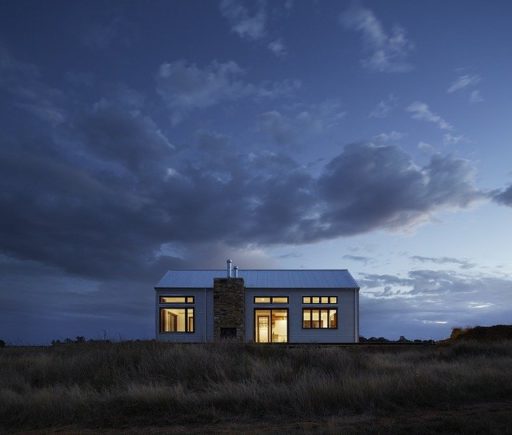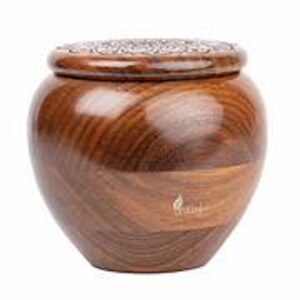I come home in the fall, the trees denuded as the plane descends, their trunks upright as quills or the bristles of a rough brush drawn across the hills, plucked clean, and laid on its back. I’ve never seen the hills so close that I can see the lake and the causeway to my dad’s new house, and on the way a church on a gravel road that curves like a familiar face. The road makes me look for the farmhouse where my grandma was born, but I miss it as we wheel. On the ground, the air is cold; we deplane on old-fashioned steps and wind single-file toward the brick airport. In hot months, this tarmac is the first place I smell home: cedar trees, limestone silt, the river’s summer sweat. Now it’s just a sharp early cold I don’t recognize. Have I forgotten it or has it forgotten me?
My dad’s new house: it’s not new anymore, but it is still strange to me; I have no memories here. My mom’s house is twenty miles north, and six miles north of her our last family home, exited with the order of a death: an inventory, the quick snatching of keepsakes, a staging, a sale. I still remember the aunt of my high school crush emailing me, having sleuthed me out on the internet: “I bought a box of books at an estate sale, and I found all your childhood journals”—the shame of public grief, of having no place for old things to go.
She dropped the journals off at my dad’s first new house, a sixties ranch I only stepped foot in once, and he saved them for a year or so. Then I stuffed them in a suitcase, flew them back to DC, and shuttled them from apartment to apartment until, the winter I wrote a letter to a Mother Superior and asked to join her Sisters, I dumped them all in a tall plastic trash bin, waiting at the curb of that year’s apartment, the journals sliding heavily through the debris and thudding like stones at the bottom of the bin.
“This is the man I want myself to be but who cannot exist, because God does not know anything about him,” Thomas Merton says in “Things in Their Identity” of the false-self trailing each heart. My handwriting above the frontispiece of New Seeds of Contemplation says I first read it ten years ago this fall, when my parents’ break began in earnest, but before their divorce and my own, my dad’s second marriage, and his divorce. Now the dust has settled and I have accidentally come back to this book.
My dad picks me up at the airport and we drive north to town, his new house receding to the south. My childhood compass knew no north; it leaned south and east for eighty miles. To count those miles seems strange. It was a world received, not charted, and as we drive the flat fields I take on its radius like a coat or a pool, something into which a body enters. I think of the childhood journals and why I threw them out. A preemptive divestment. A pointless, surplus grief. Even when the Mother Superior accepted my letter, I knew in my heart I would not go. But at least, with her consent, my life pointed somewhere.
The Merton piece is like origami, small and filigreed with its own folds: simple words repeated, built and hidden in each other. Nature as consent and completion: “A tree gives glory to God by being a tree. For in being what God means it is obeying Him. It ‘consents.’” And the “more a tree is like itself, the more it is like Him.” I have loved home for being itself: the flat land and the full clouds. And when we finish our town errands and drive south, the long crests and troughs as the land bows and rises, genuflecting toward the river.
My dad’s new house is on a valley lake, a blacktop loop of quiet homes. We ride the causeway I saw from the sky and I look up for airplanes. We turn in to the trees, and I remember the blacktop and cedars that led to our childhood home.
The Sisters’ house was angular and dim. The best room in the convent was the chapel: a window-banked gem set above the field, so that in Adoration you might look beyond the monstrance and see a deer feeding, birds falling to the tufted grass. I was almost too old to ask to join the Sisters, but I looked young and they never asked my age, so I kept returning to their motherhouse and the same guest room on the postulant’s hallway. It held a bed, a sink, a window to the trees and a small square window to the sky, the latter placed high and bare so that once, when a full moon rose on a clear night, I woke to its blazing gaze.
“Unlike the animals and the trees, it is not enough for us to be what our nature intends,” for “holiness is more than humanity,” Merton says: humanity with its shadow self and pleasure-riven heart. We cannot be saints if we can’t give these up and offer God “the worship of our imitation, which is sanctity.”
Our imitation is “attention to reality,” to God, to liberty and love, and in this he means renunciation. I read Merton’s journals a year before I read New Seeds, on an overland bus trip through the southern Sahel. A friend took a picture of me lost in the book, the pages amber with road dust, a puzzled fellow passenger reading over my shoulder. Were these the chapters where Merton’s anxious heart convulses in a middle-aged love affair with his nineteen-year-old nurse? The back and forth of pangs and declarations, snares and hopes, awkward conversations with his brother priests—a schism resolved, if I recall, by saying no and yes. Returning to his vows.
Vows. “We are at liberty to be real or unreal,” Merton says: to find our true self and so find Him, to say no and yes. I am at liberty to finally enter my father’s house, to unpack my bag, even to sleep in a room where his second family once lived—an exited daughter’s perfume still rattling in the bathroom vanity drawer, the hallway portraits still enshrining the second wedding where my father’s new son, then a young teenage boy, shuddered through the vows.
I held back tears too and watched him, wondering: if I don’t sob, will he, like the stones, cry out? But we both kept quiet until the applause, and then, as the bride and groom turned to their guests, he ran to embrace his mother and hide his tears in her fur wrap. I am at liberty to remember this and close my mouth. To say nothing where I want to demand; to acknowledge I have no children who look at me and weep when they don’t understand. To believe Merton that the secret of each identity is hidden in the mercy of God.
Laura Bramon Hassan is a writer and international development practitioner based in Washington, DC. Her writing has appeared in The Best Creative Non-Fiction, Vol. 3 (W.W. Norton), Image, University of Notre Dame’s Church Life Journal, First Things online, Humanum Review, and other outlets.





